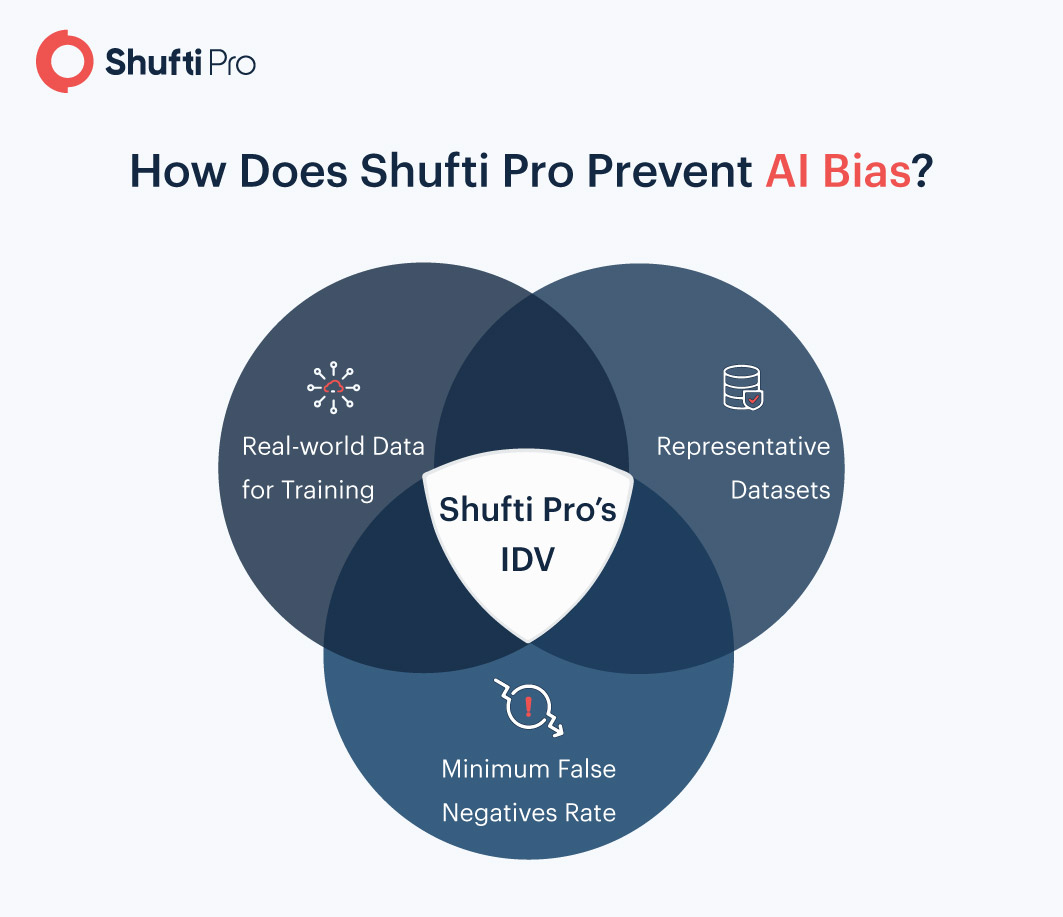Keeping AI Bias Out of the IDV Game with Shufti

Consider this: 85% of financial institutions today use some form of AI in their products. The technology is being utilized by institutions such as banks, insurance firms, and stock exchanges worldwide due to its unique ability to learn patterns and make informed decisions over time. However, the ability of AI-powered software can be affected due to demographic traits such as race, gender, socioeconomic factors, and even the quality of a smart device.
Digital identity verification solutions leverage machine learning and AI technology to verify customers online. Unfortunately, AI models are highly susceptible to bias, which can alter the end results. Shufti’s identity verification solutions synergize artificial and human intelligence, making each process/verification accurate, swift, and free from built-in bias.
What is AI Bias?
AI bias is a term that refers to a situation where ML-based solutions show bias in the end results against certain groups of people. One way AI bias occurs is through the insufficient training of AI algorithms using unrepresentative data sets. AI bias gained particular prominence in 2018 when Amazon’s “Rekognition” software falsely identified 28 members of Congress as known criminals. Since AI “thinks” the way it’s taught, large data sets are required to produce accurate results.
How Does Shufti Avoid Bias in its AI Algorithms?
Shufti’s enhanced AI models are designed keeping in mind the consequences of inaccurate identity verification. In order to avoid legal repercussions and a negative brand image, companies can opt for our IDV suite. Here’s how we ensure our products are kept bias-free.

1. Collection of Representative Data
Identity verification solutions use AI training datasets to detect patterns, learn over time, and make accurate predictions. For an IDV system to be highly effective, data representative of the communities must be used. This allows the software to collect and organize data without excluding any certain group. When the model is set to work with real-world applications, the learnt data and recognized patterns are then used for coming to a conclusion. Thus, larger the data set, better the results.
Additionally, Shufti verifies 3000+ ID types, ranging from passports and government-issued ID cards to driving licences, utility bills, and more. These documents are present in 150+ languages from 230+ countries and territories, enabling businesses to make informed decisions based on a large dataset.
2. Real-world Data
Shufti’s identity verification suite collects data from the real world instead of relying on purchased datasets or the data available online. This is because the quality of the images and documents captured with a camera in different lighting conditions varies from the quality of data collected in real time.
Download Report: Enhanced AI – Augmenting Identity Verification with Artificial Intelligence
AI models that are built on faulty images with blurred or glared sections provide unreliable results and have a higher likelihood of containing bias. To make Shufti’s ID verification solutions more robust, AI algorithms are based on real-world verification data instead of predefined datasets. This allows businesses to identify and take down fraudulent IDs and mitigate identity fraud. The models continue to improve with every verification, since they learn from different forms of real data.
3. Hybrid Business Model
Shufti intelligently addresses AI bias by adopting a hybrid model approach. This means that once AI algorithms are fed with real-world data to make precise and credible predictions, each verification result is manually cross-checked by human experts. This leaves no room for error, as continuous human audits refine AI models.
Headquartered in the UK and with offices spread across five countries, human experts at Shufti are of different nationalities, ethnicities, gender, and professional backgrounds. The diversity allows us to view issues from a different perspective to avoid targeting any specific group through AI bias.
Final Thoughts
The global scale of our operations allows us to enhance datasets, enabling businesses to verify identities with an accuracy rate of 98.67%. By using representative samples to train AI algorithms, cross-matching each verification result through human experts, accepting ID documents from 230+ countries and territories through real-world data, Shufti is successfully keeping AI bias out of the IDV game.

 Explore Now
Explore Now













